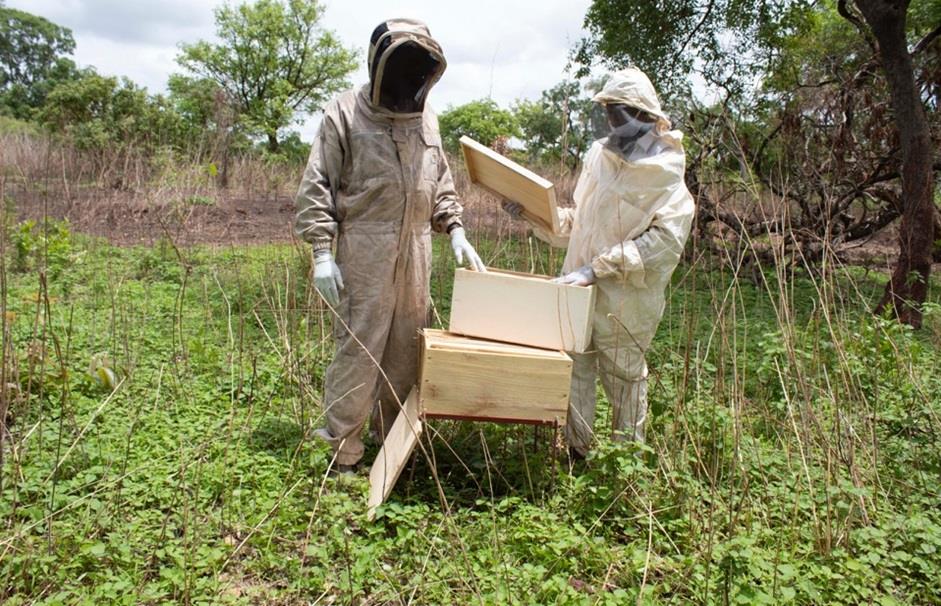Cooler hives help bees adapt to climate change

Have you ever tasted mangrove honey from Senegal? Rooted in salty water, mangroves apparently produce a honey that tastes like butterscotch and is gaining popularity in an international market.
Beekeeping is widely practiced in Senegal. 70% of its honey is produced in Casamance a region in the South of Senegal with a tropical savannah climate. In recent years climate change has begun to seriously impact honey yields.
From April 2019 to August 2020, as part of the FAO-led project, Strengthening Agricultural Adaptation (SAGA), Socodevi, a Canadian Non-Governmental Organization, implemented an initiative aiming to reinforce farmers’ capacities to adapt to the changing climate and maintain their livelihoods.
Joining forces to build resilient systems
In the Casamance village of Kamobeul, less rain, desertification, higher temperatures, and unusual flowering periods during the past few years have resulted in unfavorable environmental conditions for the bees.
Bees play a vital role in pollination, increasing agricultural produce, improving its quality and even enhancing plants’ resistance to pests.
Through the project FAO has been working with beekeepers from Kamobeul who teamed up with an Economic Interest Group (GIE) called Ahoumoula, known for the production of the rare mangrove honey. This group and 10 others from the region, form what is now known as the CAC/Miel, a promising agricultural cooperative set up to structure the packaging and marketing of honey from Casamance.
“At first, people were reluctant to join the group, but now everybody has understood that to succeed, we need to join forces to overcome together the challenges we face” Explained Etienne Manga, leader of the Ahoumoula GIE.
Adapting to the impact of climate on bees
As part of the FAO-led project Etienne and 146 other beekeepers from the CAC/Miel joined a Farmer Field School (FFS) and were trained in each step in the beekeeping process so that despite changing temperatures, the beekeepers can continue to produce and sell their honey.
The approach valued traditional practices, but beekeepers were also taught how to build modern hives that are lighter yet more resistant to forest fires and flooding. They provide a cooler environment for bees, so yields have begun to increase. In high temperatures, traditional hives quickly become too hot causing bees to desert the colony.
Gender equality
The Farmer Field Schools encouraged the participation of both men and women, by asking participants to involve other members of their family in the trainings.
Etienne described the impact these activities have had on gender equality: “Before, more tasks were attributed to women. Today, a lot of progress can be seen when a couple participates in the training together and now other couples in the village are doing the same”.
Beginning a promising new season
Last year, despite good yields, the COVID-19 pandemic dramatically impacted the beekeepers. Due to travel restrictions, the honey from Kamobeul could not reach its usual buyers. Now that the restrictions are lifted, the beekeepers have started preparing for a new season. The hives are looking healthy and full of honey, and profits for the beekeepers are just around the corner.
“What was missing was knowledge on good practices and I think that today everyone has this”, enthused Etienne.
For Etienne, if beekeepers from the CAC/Miel have an increased income from honey sales, they could expand their activities and start to make honey-based soaps, alcohol and cakes. The project would require investment, but Etienne is not giving up hope: “Everyone thinks it is a dream, but I am positive I can make it reality”.
The way forward
During the project first phase, 75 women and 72 men have been trained in honey production. This year, 125 more beekeepers from Casamance are joining the project.
Through a financial and technical partnership with the government of Quebec,the Strengthening Agricultural Adaptation, SAGA global project aims to reinforce farmers’ capacity to adapt to climate change. It facilitates policy dialogue, capacity building in civil society and research on agricultural adaptation for food security and nutrition through a holistic approach in two French-speaking countries vulnerable to the impacts of climate change: Senegal and Haiti.
Learn more:
- Website: http://www.fao.org/climate-change/programmes-and-projects/detail/fr/c/1279846/
- Senegal project sheet: http://www.fao.org/3/ca6371fr/ca6371fr.pdf (Available in French only)
